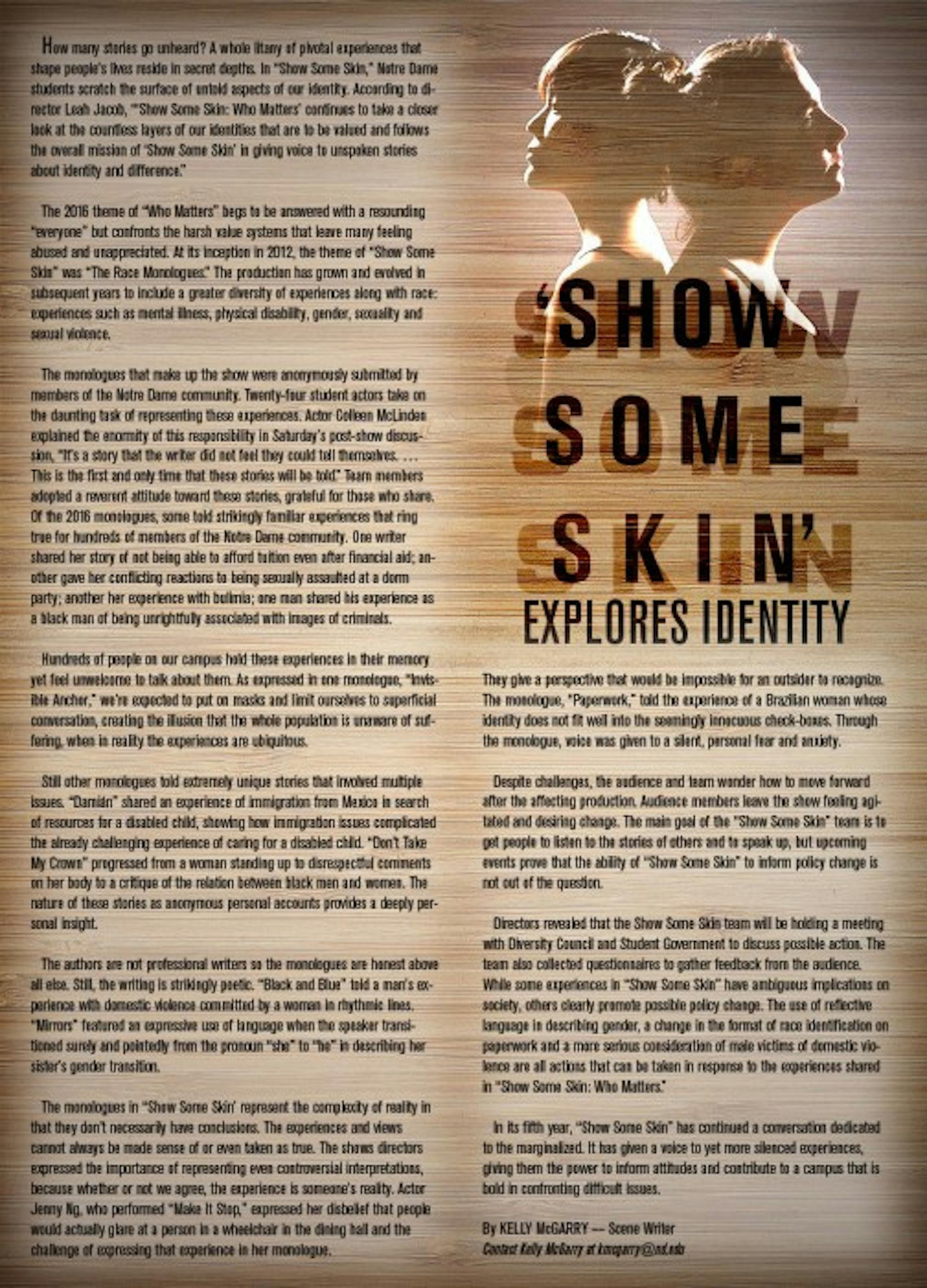
How many stories go unheard? A whole litany of pivotal experiences that shape people’s lives reside in secret depths. In “Show Some Skin,” Notre Dame students scratch the surface of untold aspects of our identity. According to director Leah Jacob, “'Show Some Skin: Who Matters' continues to take a closer look at the countless layers of our identities that are to be valued and follows the overall mission of ‘Show Some Skin’ in giving voice to unspoken stories about identity and difference.”
The 2016 theme of “Who Matters” begs to be answered with a resounding “everyone” but confronts the harsh value systems that leave many feeling abused and unappreciated. At its inception in 2012, the theme of “Show Some Skin” was “The Race Monologues.” The production has grown and evolved in subsequent years to include a greater diversity of experiences along with race: experiences such as mental illness, physical disability, gender, sexuality and sexual violence.
The monologues that make up the show were anonymously submitted by members of the Notre Dame community. Twenty-four student actors take on the daunting task of representing these experiences. Actor Colleen McLinden explained the enormity of this responsibility in Saturday’s post-show discussion, “It’s a story that the writer did not feel they could tell themselves. … This is the first and only time that these stories will be told.” Team members adopted a reverent attitude toward these stories, grateful for those who share.
Of the 2016 monologues, some told strikingly familiar experiences that ring true for hundreds of members of the Notre Dame community. One writer shared her story of not being able to afford tuition even after financial aid; another gave her conflicting reactions to being sexually assaulted at a dorm party; another her experience with bulimia; one man shared his experience as a black man of being unrightfully associated with images of criminals.
Hundreds of people on our campus hold these experiences in their memory yet feel unwelcome to talk about them. As expressed in one monologue, “Invisible Anchor,” we’re expected to put on masks and limit ourselves to superficial conversation, creating the illusion that the whole population is unaware of suffering, when in reality the experiences are ubiquitous.
Still other monologues told extremely unique stories that involved multiple issues. “Damián” shared an experience of immigration from Mexico in search of resources for a disabled child, showing how immigration issues complicated the already challenging experience of caring for a disabled child. “Don’t Take My Crown” progressed from a woman standing up to disrespectful comments on her body to a critique of the relation between black men and women.
The nature of these stories as anonymous personal accounts provides a deeply personal insight. They give a perspective that would be impossible for an outsider to recognize. The monologue, “Paperwork,” told the experience of a Brazilian woman whose identity does not fit well into the seemingly innocuous check-boxes. Through the monologue, voice was given to a silent, personal fear and anxiety.
The authors are not professional writers so the monologues are honest above all else. Still, the writing is strikingly poetic. “Black and Blue” told a man’s experience with domestic violence committed by a woman in rhythmic lines. “Mirrors” featured an expressive use of language when the speaker transitioned surely and pointedly from the pronoun “she” to “he” in describing her sister’s gender transition.
The monologues in “Show Some Skin’ represent the complexity of reality in that they don’t necessarily have conclusions. The experiences and views cannot always be made sense of or even taken as true. The shows directors expressed the importance of representing even controversial interpretations, because whether or not we agree, the experience is someone’s reality. Actor Jenny Ng, who performed “Make It Stop,” expressed her disbelief that people would actually glare at a person in a wheelchair in the dining hall and the challenge of expressing that experience in her monologue.
Despite challenges, the audience and team wonder how to move forward after the affecting production. Audience members leave the show feeling agitated and desiring change. The main goal of the "Show Some Skin" team is to get people to listen to the stories of others and to speak up, but upcoming events prove that the ability of “Show Some Skin” to inform policy change is not out of the question.
Directors revealed that the Show Some Skin team will be holding an open meeting with Diversity Council and Student Government to discuss possible action Wednesday at 6:30 p.m. in the Oak Room of South Dining Hall. The team also collected questionnaires to gather feedback from the audience. While some experiences in “Show Some Skin” have ambiguous implications on society, others clearly promote possible policy change. The use of reflective language in describing gender, a change in the format of race identification on paperwork and a more serious consideration of male victims of domestic violence are all actions that can be taken in response to the experiences shared in “Show Some Skin: Who Matters.”
In its fifth year, “Show Some Skin” has continued a conversation dedicated to the marginalized. It has given a voice to yet more silenced experiences, giving them the power to inform attitudes and contribute to a campus that is bold in confronting difficult issues.













